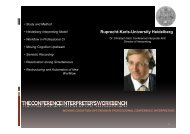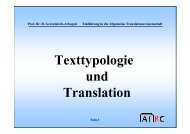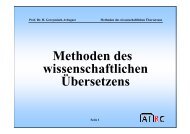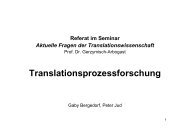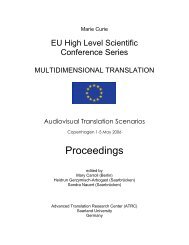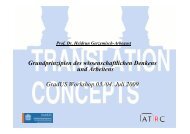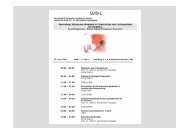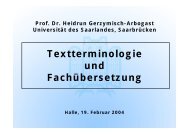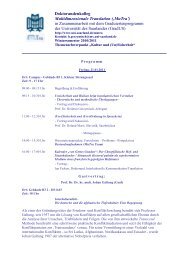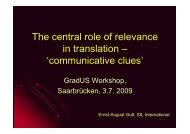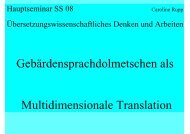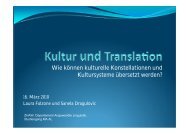Proceedings - Translation Concepts
Proceedings - Translation Concepts
Proceedings - Translation Concepts
You also want an ePaper? Increase the reach of your titles
YUMPU automatically turns print PDFs into web optimized ePapers that Google loves.
MuTra 2005 – Challenges of Multidimensional <strong>Translation</strong>: Conference <strong>Proceedings</strong><br />
Mira Kadric<br />
Overall evaluation of theory<br />
Percent<br />
70<br />
60<br />
50<br />
40<br />
30<br />
20<br />
10<br />
0<br />
60.8<br />
33.8<br />
4.6<br />
0.8<br />
excellent very good good satisfactory<br />
Diagram 4:<br />
Overall evaluation of theory<br />
From a didactic point of view it is important to note that the choice of teaching materials<br />
for cross-language courses plays an important role and is a very difficult task. In order to<br />
satisfy the various interests of all the course participants, with their different educational<br />
backgrounds and experience, 9 special didactic competences and special experience on the part<br />
of the trainer are indispensable.<br />
Diagram 4 shows the participants’ evaluation of the entire “theory” section of the seminar<br />
according to the same scale as for the questions above:<br />
3.2 Evaluation of the exercises<br />
The question group about the “exercises” focuses on the applicability of the various<br />
techniques that were practised during the course, on the demands made on the participants<br />
and on the quality of cooperation among course participants. The opinions of the participants<br />
about the relevance of the exercises for their future career and the demands made on them are<br />
given below.<br />
In the first question of this group, the course participants were asked to assess whether the<br />
contents of the exercises were, in their opinion, very important, relatively important or not<br />
important for working as a court interpreter. Another question asked the participants whether<br />
the demands made on them were too high, just right or too low. This question was important<br />
because of the differences in the participants’ background knowledge. Its aim was to see<br />
whether the seminar succeeded in addressing the participants’ individual needs and in making<br />
the appropriate individual demands on each participant. The next question dealt with the<br />
quality of the cooperation between the participants themselves. The evaluation of this<br />
question was very interesting given the heterogeneity of the group (different background<br />
knowledge, approaches and languages of the participants).<br />
Diagrams 5, 6 and 7 show the results of the above listed questions:<br />
9 The „natural“ interpreters often asked for ready-made solutions for the problems.<br />
182



